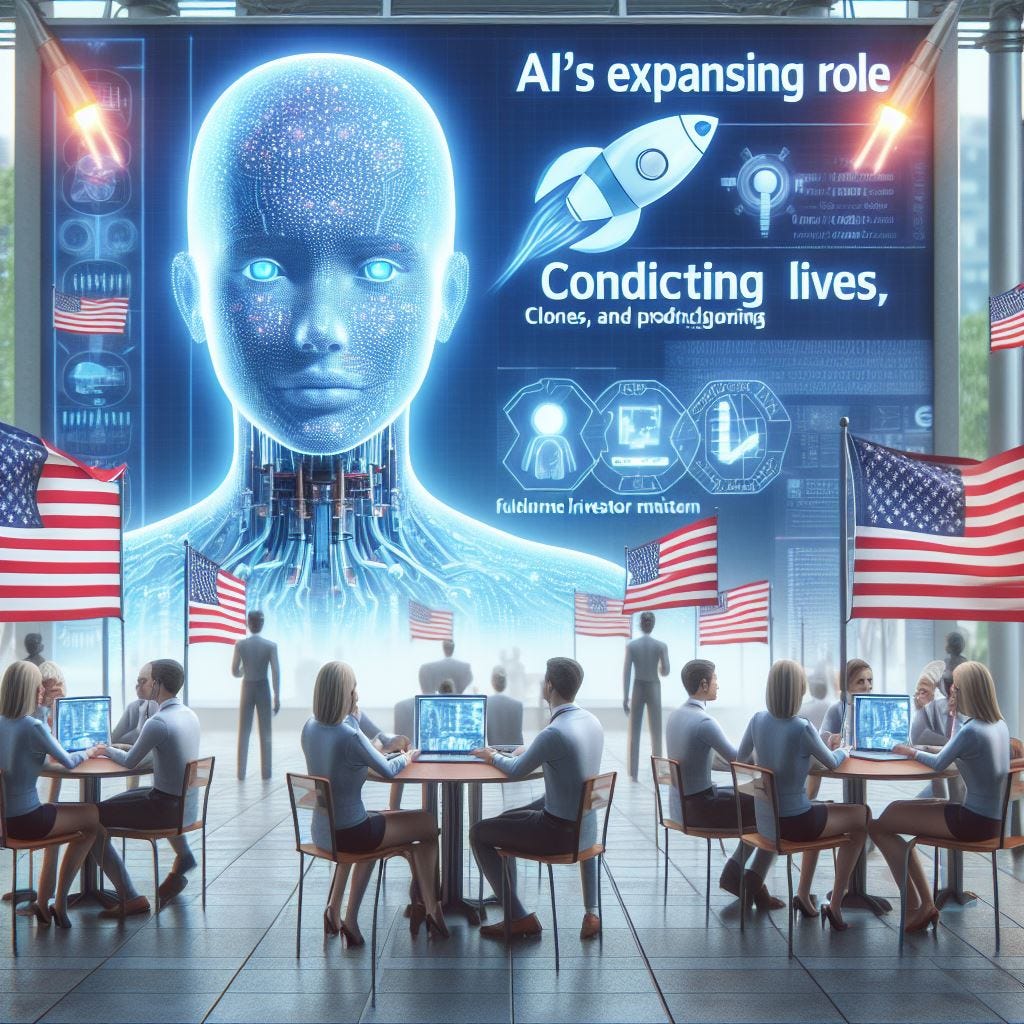AI's Expanding Role: Clones Campaigning, Predicting Lives, and Fueling Investor Optimism
The Booms and Risks of Our AI-Powered Future
Imran Khan Uses AI Clone to Give Virtual Campaign Speech from Jail
- Former Pakistan PM Imran Khan remains jailed on charges he says are fabricated
- His party used AI to create a “voice clone” to deliver Khan’s campaign speech
- The AI simulation voiced a script written by Khan urging supporters to vote
- Over 4.5 million viewed the virtual rally despite internet disruptions
- Some find the technology concerning, but it drew attention to Khan’s imprisonment
Investors Bet on AI's Explosive Growth Despite Looming Challenges
- Lightning-fast adoption of ChatGPT has VCs racing to fund AI startups
- Leading firms predict AI will transform industries through easy-to-integrate APIs
- But foundational models behind these tools require billions in compute costs
- Most investors target developers building apps atop unstable AI foundations
- They believe talented builders can find profits despite narrow margins
- Investors caution adoption barriers around trust, jobs, and regulations persist
- But remain bullish that ingrained AI can drive exponential efficiency gains
AI Model Predicts Life Events and Mortality with Unsettling Accuracy
- Researchers developed AI model life2vec to predict life events and mortality
- By analyzing health/career data of 6M Danes, it outperforms other neural nets
- Model's ability to forecast personal details raises critical ethical questions
- Researchers aim to incorporate more data types to enhance life2vec's forecasts
- While promising for medical research, risks emerge in deploying model commercially
- More interdisciplinary dialogue needed on expanding role of predictive AI
HEADLIME IS THE GO-TO GPT-3 TOOL FOR MARKETERS.
WRITESONIC IS ONE OF THE BEST ARTIFICIAL INTELLIGENCE-POWERED COPYWRITING GPT-3 TOOLS.
FASTPICTORY VIDEO CREATION MADE EASY
Investors Bet on AI's Explosive Growth Despite Looming Challenges
The lightning-fast adoption of AI chatbots like ChatGPT has investors racing to fund artificial intelligence startups. Leading VC firms predict AI will broadly transform industries through easy-to-integrate APIs.
However, the foundational models underpinning these tools demand billions in compute costs. Most VCs are instead targeting developers building applications and data tools atop these unstable AI foundations. They believe creative builders can find profit despite narrow margins, at least until costs inevitably decrease.
Investors caution that realizing AI’s potential requires overcoming adoption barriers around trust, regulation, and potential job losses. But they remain bullish that once ingrained into business workflows, AI can drive exponential efficiency gains. Though acknowledging risks tied to AI's opacity and potential biases, VCs are placing overwhelming bets that AI will prove the next massive platform shift.
The Mystery Behind ChatGPT's Apparent Upgrade to GPT 4.5
Over the weekend, many ChatGPT users reported the AI claiming it was now using an upgraded model called “GPT 4.5 Turbo.” This sparked speculation that OpenAI had quietly deployed an enhanced version of its technology powering the chatbot.
However, OpenAI employees have denied these user reports, calling them “weird and oddly consistent hallucinations.” The officials maintain ChatGPT still relies solely on the GPT-4 architecture.
Nonetheless, multiple experts have noticed ChatGPT demonstrating faster response times and higher quality responses since the weekend. Though not a radical transformation indicative of a new model, the improvements are tangible.
OpenAI likely updated ChatGPT’s system prompt and made optimizations to improve speed and reliability. But the Ai’s spontaneous “GPT 4.5 Turbo” claims remain confusing. OpenAI continues cryptically tweeting emojis, stoking speculation.
While ChatGPT appears better, OpenAI denies upgrading its foundation model. Still, the Ai’s insistence on “4.5 Turbo” gives the impression it may have more self-knowledge than its creators admit. The reality behind ChatGPT’s boost remains unclear.
Imran Khan Uses AI Clone to Give Virtual Campaign Speech from Jail
Former Pakistan Prime Minister Imran Khan remains imprisoned on charges he says were fabricated to prevent him from contesting upcoming elections. Unable to physically attend his party's latest rally, Khan utilized artificial intelligence to deliver a campaign speech nonetheless.
The Pakistan Tehreek-e-Insaf party commissioned an AI firm to create a "voice clone" of Khan based on prior speech samples. Through smuggled notes, Khan provided a speech script attacking his detention and urging supporters to vote. The AI simulation voiced this script during the virtual rally's livestream, interspersed with real footage of Khan at past events.
While not wholly convincing in tone or grammar, the mimicry broadly captured Khan's rhetorical style. Over 4.5 million viewed the stream across social platforms, impressive given concurrent internet disruptions that watchdog groups believe were politically motivated.
The simulation allowed Khan to circumvent restrictions on physical campaigning. While some feel AI can never replace genuine rallies, the PTI believes employing new technologies shows its modern sensibilities. The stunt also drew global attention to Khan’s imprisonment weeks before pivotal elections. Though a logistical feat, the ethical implications of using AI for deception in politics remain concerning.
AI Model Predicts Life Events and Mortality with Unsettling Accuracy
Researchers have developed an AI model called life2vec that can predict life events and even estimate individuals' time of death with remarkable precision. By analyzing extensive health and career data on 6 million Danes, the transformer-based system outperforms other neural networks in forecasting outcomes like personality traits and mortality.
The model's ability to extrapolate such sensitive personal details from sequences of life events raises critical ethical questions around privacy, bias, and regulating AI's encroachment into healthcare and social sciences. Yet the researchers aim to incorporate even more data types to enhance life2vec's forecasts.
While promising for medical research, deploying AI to predict individuals' life trajectories poses risks if used for advertising or by insurance companies. More interdisciplinary dialogue is needed on AI's expanding role in society before personalizing predictive models.










